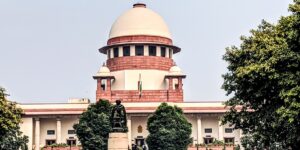 New Delhi: The Supreme Court has decided to adjourn until after the Lok Sabha election, pleas seeking the release of voter turnout data, including votes polled and/or rejected, within 48 hours of the end of polling at each booth.
New Delhi: The Supreme Court has decided to adjourn until after the Lok Sabha election, pleas seeking the release of voter turnout data, including votes polled and/or rejected, within 48 hours of the end of polling at each booth.
The pleas had requested the Election Commission to compile and publish this data on its website after each phase of voting, beginning with the next round for the 2024 Lok Sabha election.
A vacation bench, comprising Justices S Narasimha and Sanjay Karol, reasoned that an immediate ruling could “overburden the Election Commission during polls… by changing the process midway”. The bench noted that five of seven voting phases had already been completed and that the election results were due in less than two weeks, on June 4.
Significantly, the court pointed out that the interim appeal by the petitioner, the Association for Democratic Reforms (ADR), bore similarities to a writ petition filed by Trinamool Congress’s Mahua Moitra in 2019. Moitra’s petition had sought a protocol mandating the reporting of Form 17C data within 48 hours for a Lok Sabha election, a matter that remains unresolved.
“We are simply adjourning and providing one observation as to why relief cannot be granted at this stage,” the court stated, clarifying that this did not constitute a dismissal of the pleas. “Prima facie we are not inclined to grant relief at this stage, in view of the similarity of prayers… granting interim relief would amount to final relief. Therefore, we list these applications after the vacation.”
Justice Datta emphasized the court’s stance: “This application will be heard after the election… in-between an election, hands off! We cannot interrupt the electoral process… we are also responsible citizens.”
During the hearing, senior advocate Maninder Singh, representing the Election Commission, criticized the petition as a “classic case of abuse of law,” arguing it was intended to “erode the integrity of the election”. He dismissed the allegations as false and based on mere apprehensions.
The Supreme Court’s decision underscores its reluctance to intervene in ongoing electoral processes, maintaining the sanctity and integrity of the elections while ensuring that procedural changes are considered post-election to avoid disrupting the current voting phases.

